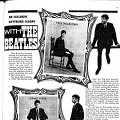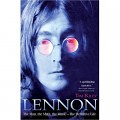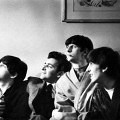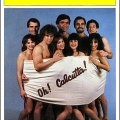- From Faith Current: “The Sacred Ordinary: St. Peter’s Church Hall” - May 1, 2023
- A brief (?) hiatus - April 22, 2023
- Something Happened - March 6, 2023

Nope, nothing sexual going on here.
Commenter @King Kevin asked me yesterday whether I’d read the book Sex At Dawn, a fascinating and controversial attempt to explain contemporary human sexual behavior via “anthropology, archaeology, primatology, anatomy, and psychosexuality.”
One of the book’s primary contentions is that human females are as randy as males, if not more so — and it takes maximum effort and much selective vision on our society’s part to make it seem otherwise. From the book:
“And yet, despite repeated assurances that women aren’t particularly sexual creatures, in cultures around the world men have gone to extraordinary lengths to control female libido: female genital mutilation, head-to-toe chadors, medieval witch burnings, chastity belts, suffocating corsets, muttered insults about ‘insatiable’ whores, pathologizing, paternalistic medical diagnoses of nymphomania or hysteria, the debilitating scorn heaped on any female who chooses to be generous with her sexuality…all parts of a worldwide campaign to keep the supposedly low-key female libido under control. Why the electrified high-security razor-wire fence to contain a kitty-cat?”
It’s all imposed, taking away women’s sexual agency and handing it over to men. We commodify a biological behavior, turning a piece of one’s essential personhood into a kind of wealth owned by someone else. To be hoarded, traded, used to sell junk. This is absurd and outrageous, and causes all sorts of pent-up rage.
I am not telling you anything you don’t know — 50% of you, at least.
So why am I bringing this up? Because, as others have posted — and go read Nancy’s post if you haven’t — Beatlemania was largely female-driven. But the objects of all that frenzy were men. This was bad enough — everyone from William F. Buckley to Allan Sherman were threatened as hell — and the male-controlled popular culture heaped scorn on the whole thing. Especially the long hair. What was the big deal about the Beatles’ hair?
John, Paul, George and Ringo’s hair was a declaration of war on gender norms, a message in code smuggled from them to women all over the West. Though the Beatles were all heterosexual 1 men, their long hair was a sign that they did not play by the conventional American sexual/gender roles. As any devoted Mad Men viewer knows, these were no picnic for women; if Ike’s message was “no sex”, JFK’s was “a quickie by the White House pool, where you might catch something and I won’t even remember your name.”
Such a shitty deal can’t stay in place naturally; there’s gotta be real punishment for those who stray. And yet here were these four guys from England, four aliens, showing it could be different. It could be different? Sign me up! For all the pushback that the Beatles received, it would’ve been a hundred times worse if they’d been female. If four women had been spreading that message, and having that effect, they wouldn’t have been the butt of jokes; they would’ve been torn to pieces.
Beatlemania isn’t Biebermania, and you can tell by how the people in power reacted to it. Like Sinatra at the Paramount, or Presley for a time, the popularity of the Beatles was seen as a clear and present threat to male dominance, and all the male authorities, men who’d thrown their reproductive lot in with the old ways, wanted it stopped. The Beatles kicked a hole in America’s gender norms, and a generation’s worth of repressed female sexuality (and some male, too) poured through. This made Beatlemania a pop cultural event with primal energy behind it. Sure the songs were great, but there was something more going on.
Suddenly the frenzy makes sense. It was an attempt to rebalance something natural; something that had been forced out of balance for at least twenty years, or maybe twenty thousand. None of this is provable, of course — that’s not how this stuff works. But the moment I thought of it, I felt I understood Beatlemania a bit better than I had, so I wanted to pass it along. I look forward to hearing what you think.
- Footnote courtesy of Yoko Ono. ↩













“Though the Beatles were all heterosexual men, their long hair was a sign that they did not play by the conventional American sexual/gender roles.”
.
We’ve been here before… but I really ask you “Really?”
.
What was threatening? “The long hair” or “the long hair plus the succes” or the succes among the girls?
.
And…
.
What about Japan? What about Europe? What about Scandinavia, which was way ahead of England, let alone the USA?
…and really I really answer you, @Rob. Yes, really.
If you read about the reaction of the American press to the Beatles, the length of their hair is a constant source of questioning and abuse. It’s peculiar, and clearly not about hair.
What about Japan? Europe? Scandanavia? I couldn’t say, but I do note that in France, where sexual mores were different, the mania seems to have been much more muted (and the Beatles noted that the “voice” of the crowds was much deeper).
But it doesn’t much matter to the larger point. The United States was the whole ball of wax in 1964; this was the very tail-end of America’s postwar cultural and economic dominance. In 1957, it was a one-way channel — money, power, culture out from the US to the rest of its client-states; this is why the Beatles were listening to Arthur Alexander and not, say, some French person. The emergence of the Beatles is one of the first signs that this arrangement was changing, that it was becoming a two-way channel; and in some sense, the Beatles’ coding wasn’t even provincial English, but avant-garde German and French.
But the US was everything; that’s how the Beatles viewed it, and with very good reason. The US was to the West what the USSR was to the Communist world. As many have said, The Beatles without America would’ve been Cliff Richard.
The “long hair” (long in those days) was a BIG deal. BIG. They were ridiculed for “looking like girls”. In addition to the long hair (which they shook constantly, for effect) they sang in falsetto, wore boots with cuban heels and generally were the first androgynous band of the 20th century.
So, yeah, Rob–REALLY. 🙂
It was said (I don’t know about which concert — Ed Sullivan?) that the event maintenance people found countless pairs of “sodden knickers” among the seats after the performance. The only way I can produce such an event is with a firehose.
Aw, @sir, I’m sure you have your devotees.
I remember reading that knickers comment when I was too young to understand it. My ever-cool Beatle Aunt explained it to me. (If you like this site, thank her for starting me off right.)
Sex at Dawn’s author Christopher Ryan has a fantastic podcast called Tangentially Speaking: http://chrisryanphd.com/tangentially-speaking/. It is well worth a listen. He is working on his next book right now, which I believe is going to be called ‘Civilized to Death’. Whether you agree with his hypothesis or not, Sex at Dawn is a fascinating read- highly recommended!
I’ll summarize: “the Beatles swished into rough neighborhoods and stole the girlfriends of thugs everywhere. It is amazing they did not get their asses kicked more often than they did.”
—-
On Saturday January 7 [1961], Neil took them to Aintree Institute for their first booking at this atmospheric upstairs hall not far from the Grand National racecourse. Again, Neil was staggered by how the Beatles made a direct and instant impact on people who’d never heard of them and were expecting nothing out of the ordinary: “All the people were there as normal and suddenly the Beatles came on and everybody who was anywhere in the hall, anyone who was dancing, stopped and came forward, straight to the front of the stage. They stood there with their mouths open. The Beatles caused a lot of trouble because all the Teds who’d brought their girls to the dance got very jealous, and then John did this big fucking wink, which really wound them all up.”
Lennon’s big wink was a new instrument in his stage armory, transmitting maximum sarcasm and provocation in one move. It was a music-hall wink, a wink with inbuilt windup, with attitude, accompanied always by a sideways chasm in the mouth, a great gaping oval. It was seldom impotent, and if a fight wasn’t already in the air, this could kick one off—inciting tempests which to John, as blind as a bat, were but a violent blur. Tough nuts at Aintree Institute used as weapons any wooden chairs around the edge of the dance floor that weren’t bolted together, and some went up to the balcony and lobbed chairs down from there, causing mayhem.
Considering the ever-present danger, the Beatles were assaulted surprisingly few times. It did happen, but only rarely. Paul was reliably effective in a role familiar and necessary from four years of Lennon friendship: pouring oil on his troubled waters, taking the heat out of his steam, pulling him—and often all of them—back from brinks to which they were so recklessly propelled.
— Mark Lewisohn, The Beatles: All These Years (Vol.1) – Tune In. (proof copy) (2013)
Wow, Chelsea, you own a proof reading copy of Lewisohn’s Tune In?? (extended or abbreviated version?)
@Rob, no, that is the dear amoralto! I found that quote on her tumblr.
Also, in case it adds anything to the discussion, I offer this adorable picture of a lesbian couple enjoying a Beatles concert. 🙂
How do we explain Ned Flanders’ preoccupation?
https://www.youtube.com/watch?v=yJS77bl0z1Y
Like the young women at the concerts, Ned Flanders uses Beatlemania as a way to sublimate his repressed sexual desires. DUH!
The parallels between the frenzied girls at Beatles concerts and the Maenads of Greek mythology is striking, suggesting the phenomenon was not just a singular historical event but a manifestation of an archetypal pattern. The Maenads were female followers of Dionysus who whipped themselves into ecstatic states through dance and booze. In Euripides’ The Bacchae, the Maenads murder Pentheus, the King of Thebes, when he outlaws the worship of Dionysus. The William F. Buckley types had good reason to be afraid.
Later, in Roman times, @Chris, the cult of Bacchus (Romanized Dionysus) was outright banned in 186 BC (about twenty years after it had first appeared in Rome). Romans couldn’t participate in such things under threat of death.
Quoting Wikipedia now on the scandal: “Livy claims the earliest version as open to women only, and held on three days of the year, in daylight; while in nearby Etruria, north of Rome, a “Greek of humble origin, versed in sacrifices and soothsaying” had established a nocturnal version, added wine and feasting to the mix, and thus acquired an enthusiastic following of women and men; Livy says that [an Etruscan priestess] named Paculla Annia corrupted Rome’s unofficial but morally acceptable Bacchic cult by introducing the Etruscan version, with five, always nocturnal cult meetings a month, open to all social classes, ages and sexes—starting with her own sons; the new celebrations and initiations featured wine-fueled violence and violent sexual promiscuity, in which the screams of the abused were drowned out by the din of drums and cymbals. Those who resisted or betrayed the cult were disposed of. Under cover of religion, priests and acolytes broke civil, moral and religious laws with impunity. Livy also claims that while the cult held particular appeal to those of uneducated and fickle mind (levitas animi), such as the young, plebeians, women and “men most like women”, most of the city’s population was involved, and even Rome’s highest class was not immune. An ex-initiate and prostitute named Hispala Faecenia, fearing the cult’s vengeance for her betrayal but more fearful for her young, upper class client and protegé, told all to the consul Postumius, who presented it to a shocked Roman senate as a dire national emergency. Once investigations were complete, the senate rewarded and protected informants, and suppressed the cult “throughout Italy”—or rather, forced its reformation, in the course of which seven thousand persons were arrested, most of whom were executed.”
“while the cult held particular appeal to those of uneducated and fickle mind (levitas animi), such as the young, plebeians, women and ‘men most like women’, most of the city’s population was involved, and even Rome’s highest class was not immune”…which is exactly, exactly how the ruling classes of the West characterized Beatlemania 1700 years later.
An interesting roundup of press reaction to Beatlemania.
Re the roundup of press reaction to Beatlemania:
.
This has to be my favourite: “The Beatles are not merely awful; I would consider it sacrilegious to say anything less than that they are god awful. They are so unbelievably horribly, so appallingly unmusical, so dogmatically insensitive to the magic of the art that they qualify as crowned heads of anti-music, even as the imposter popes went down in history as “anti-popes.”
.
A year later Lennon McCartney won 5 Ivor Novello Awards. 🙂
WOW, what an f’in windbag!
On the other hand, there was that Times critic who called them (justifiably) “the greatest songwriters since Schubert” and befuddled Lennon with his discovery of Aeolian cadences (“exotic birds?”) in his music.
“On the other hand, there was that Times critic who called them (justifiably) “the greatest songwriters since Schubert” and befuddled Lennon with his discovery of Aeolian cadences (“exotic birds?”) in his music.”
.
I remember that one too. John, in particular, always had funny put-downs. I love this one:
.
Reporter: Your program was reviewed by a music critic, and uhh…
RINGO: (comically exaggerated) “OH NO!!
(laughter)
RINGO: Not again!!!
Reporter: (reading from newspaper) …and he said that you had ‘unresolved leading tones, a false modal frame ending up as a plain diatonic.’ What would you say to that?
JOHN: He ought to see a doctor about that.
Sexual intercourse began
In nineteen sixty-three
(Which was rather late for me)—
Between the end of the Chatterley ban
And the Beatles’ first LP.
Up to then there’d only been
A sort of bargaining,
A wrangle for the ring,
A shame that started at sixteen
And spread to everything.
Then all at once the quarrel sank:
Everyone felt the same,
And every life became
A brilliant breaking of the bank,
A quite unlosable game.
So life was never better than
In nineteen sixty-three
(Though just too late for me)—
Between the end of the Chatterley ban
And the Beatles’ first LP.
(Philip Larkin)
I’ve always adored this poem. It gives such a clear sense of what it must have been like to be alive during that time. That is one of the things that mustn’t be lost in the Beatles’ story; the degree of liberation they participated in, represented, and encouraged. Without an understanding of that–without feeling that sense of personal freedom in your bones–the whole eight-year phenomenon seems like hype, which it wasn’t, or nostalgia, which it isn’t.